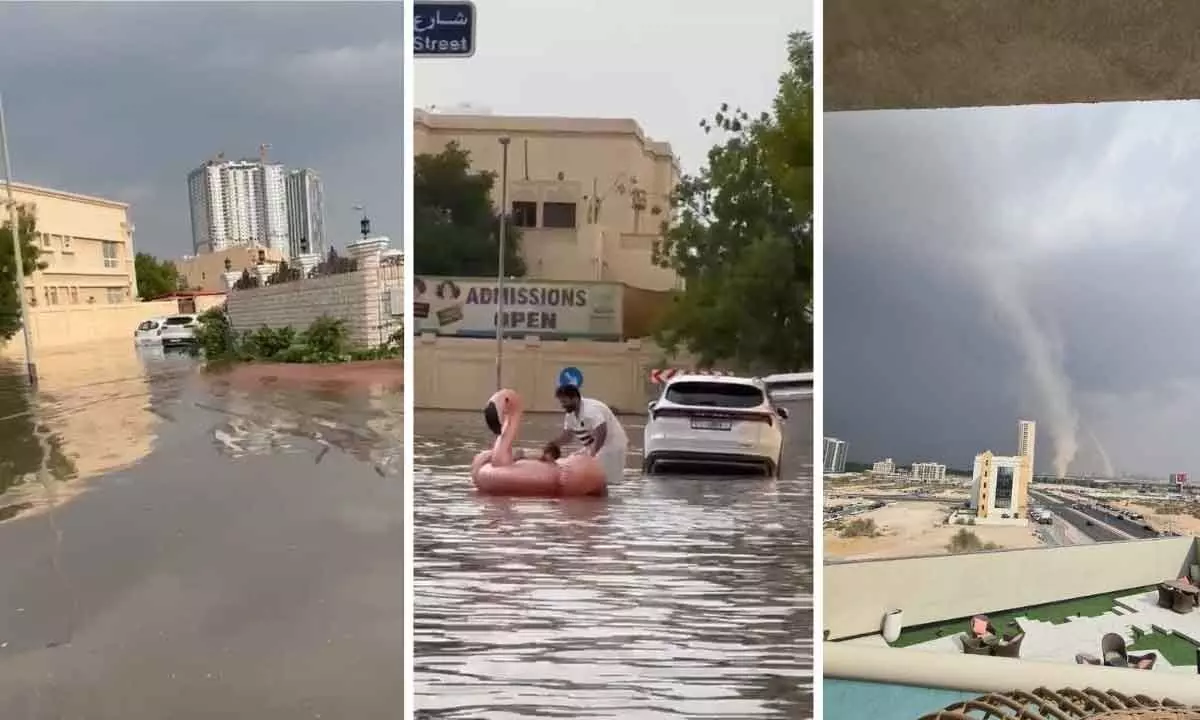Live
- Poonch terror attack: Security forces release sketches of two terrorists
- Constituency Watch: For BJP it’s fight for consolidation while Congress sees an opportunity to regain past glory in Nandurbar
- Congress, BRS, AIMIM following Muslim League agenda: J P Nadda
- PeopleStrong, Google Cloud join hands to transform employee experience with AI
- Siguler Guff invest Rs 240 crore in Hyderabad-based microfinance lender Spandana Sphoorty
- 'BJP CM will take oath in Odisha on June 10', roars PM Modi at Berhampur rally
- Five-year-old boy found dead after being swept away in Texas floodwaters
- Akhilesh appoints Shyam Lal Pal as new state president of SP
- Manipur: Educational institutions close for two days after heavy rains, hailstorm
- End of BJD rule on June 4, says Modi
Just In
Caught unawares: Dubai must brace for future storms


From entrepreneurs to job seekers, business expos to entertainment events, sports tourneys to food festivals, not to mention tourists, Dubai beckons...
From entrepreneurs to job seekers, business expos to entertainment events, sports tourneys to food festivals, not to mention tourists, Dubai beckons all despite its scorching heat and arid climate. It is unimaginable to think of rains, leave alone a deluge. In a rare turn of events, devastating rains swept across Dubai and the United Arab Emirates (UAE), causing widespread disruption, particularly in air traffic operations. The typically arid region experienced an unprecedented deluge, leading to significant challenges for both residents and travelers. While some may see this as a negative development, there are actually many benefits to the rain in Dubai.
First and foremost, the rain provides much-needed relief from the oppressive heat that characterises Dubai’s climate. During the summer months, temperatures can soar from a moderate 33 degrees Celsius to 45 degrees. This makes it nearly unbearable to be out in the open for extended periods of time. The rain helps to cool things down and provide some respite from the intense heat, allowing residents and visitors to enjoy the outdoors in a more comfortable environment. Additionally, the rain helps to replenish Dubai’s water supply, which is crucial in a city where water is a scarce resource. The rainfall fills up reservoirs and aquifers, ensuring that there is an adequate supply of water for drinking, irrigation, and other essential needs. This is especially important in a desert environment like Dubai, where water conservation is a top priority.
Furthermore, the rain helps to clean the air and reduce pollution in the city. The precipitation washes away dust and other pollutants, improving air quality and making it healthier for residents to breathe. This is particularly important in a city like Dubai, where air pollution levels can be high due to factors such as traffic congestion and industrial emissions.
Despite these benefits, the rain in Dubai has also brought with it some challenges. The city’s infrastructure is not well-equipped to handle heavy rainfall, leading to flooding and waterlogging in some areas. Roads become slick and dangerous, and buildings can suffer water damage if not properly waterproofed. This has led to disruptions in daily life and increased costs for repairs and maintenance.
To address these challenges, Dubai needs to invest in better drainage systems and infrastructure to mitigate the impact of heavy rainfall. This will help to prevent flooding and waterlogging, ensuring that the city can continue to function effectively even during periods of inclement weather. In addition, residents and businesses need to take proactive measures to protect their properties from water damage, such as installing proper drainage systems and waterproofing measures. With the deluge videos going viral, netizens are comparing Dubai to the cities in Asia and Latin American nations.
As the UAE grappled with the aftermath of the deluge, city fathers vowed to bolster measures to gear up for future surprises by nature. Lessons learned from this unprecedented rainfall will likely create strategies for infrastructure development, urban planning, and emergency response protocols, as the region adapts to the realities of a changing climate.
While the rains brought about temporary chaos, they also served as a stark reminder of the need for proactive measures to build resilience and adaptability in the face of evolving environmental challenges.
As Dubai and the UAE strive to maintain their status as global hubs of commerce and travel, investing in robust infrastructure and disaster preparedness will be essential to weathering future storms.

© 2024 Hyderabad Media House Limited/The Hans India. All rights reserved. Powered by hocalwire.com






